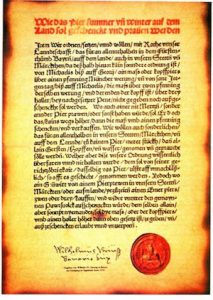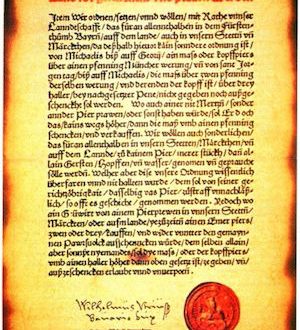 Religious reformer Martin Luther once famously said that, “he who has no beer, has nothing to drink,” and the Germans are certainly similarly passionate about their brew.
Religious reformer Martin Luther once famously said that, “he who has no beer, has nothing to drink,” and the Germans are certainly similarly passionate about their brew.
22nd April 2016 marks the 500th anniversary of Duke William IV of Bavaria signing the Reinheitsgebot, the German Beer Purity Law. The law ensures that traditional German beer only contains four ingredients – water, hops, malt and yeast (the yeast was actually added to the list later).
The law is still on the books, albeit with some exceptions. Originally, the Reinheitsgebot stipulated that only barley could be used for beer, as other grains (including wheat) were too valuable to the population as food to be used in beverages.
The Reinheitsgebot – which translates to ‘divine commandment’ has been the subject of heated debate – some factions love the fact that their signature brew is so simple and free of preservatives and gimmicks – others find it restrictive in this age of craft beers, which often include unusual flavours.
However, using these four simple ingredients hasn’t held them back too much – German brewers have created some 5,000 different beers under the law.
Throughout Europe, other countries brew beer containing anything from cherries to coriander. The Brandenberg Beer War, as it came to be known, was started after a local brewer near Berlin wanted to include sugar in his black beer.
It took 10 years of legal wrangling for him to be allowed to call his product beer in Germany.
Germans are rank second in the world – after the Czechs – for annual beer consumption, consuming some 98 litres per person each year (Kiwis imbibe a paltry 79 litres). The fastest growing category in German beer is now the alcohol free variety.
Dr Hans-Georg Eils, president of the German Brewers Federation, and Friedrich Düll, president of the Bavarian Brewers Federation, are convinced that ‘If Germany is still regarded as the undisputed beer nation, that is due to the purity law’.
The purity law for German beer is to become a world cultural heritage with an application to UNESCO, by the German Brewers Federation. It is believed that the Reinheitsgebot is the world’s oldest food law that is still in force.
Prost!










Join the Discussion
Type out your comment here:
You must be logged in to post a comment.